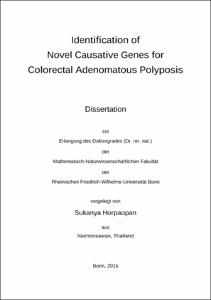Identification of Novel Causative Genes for Colorectal Adenomatous Polyposis

Identification of Novel Causative Genes for Colorectal Adenomatous Polyposis

| dc.contributor.advisor | Aretz, Stefan | |
| dc.contributor.author | Horpaopan, Sukanya | |
| dc.date.accessioned | 2020-04-20T20:26:45Z | |
| dc.date.available | 2020-04-20T20:26:45Z | |
| dc.date.issued | 26.02.2015 | |
| dc.identifier.uri | https://hdl.handle.net/20.500.11811/6422 | |
| dc.description.abstract | In up to 50% of families with clinically verified adenomatous polyposis no germline mutations in the established genes APC and MUTYH can be identified during routine diagnostics although the presence of high numbers of colorectal adenomas strongly argues for an underlying genetic cause, either as a monogenic or genetically complex trait. Therefore, the aim of this study was (i) to identify cryptic germline mutations in the APC gene which were not detected by routine diagnostics; (ii) to identify novel causative genes of adenomatous polyposis by a genome-wide SNP-array based CNV analysis, and (iii) to further evaluate the pathogenic relevance of the candidate genes by additional experiments including screening for germline point mutations in the patient cohort. Firstly, a functional study at the mRNA (transcript) level was carried out to look for deep intronic APC mutations. We identified aberrant transcript patterns in 8 (6%) of 125 unrelated patients. Five of them carried a founder germline mutation in intron 4 and three patients showed germline point mutations in intron 10, which lead to the inclusion of a pseudoexon 4 and a pseudoexon 10 on transcript level. The pseudoexons are predicted to result in frameshift mutations and premature stop codons. Therefore, a few deep intronic mutations contribute substantially to the APC mutation spectrum and cDNA analysis and/or target sequencing of intronic regions should be considered as an additional mutation discovery approach in polyposis patients. To uncover novel causative genes in patients with unexplained adenomatous polyposis, a genome-wide analysis of germline copy number variants (CNV) using high-resolution SNP arrays was performed in 221 unrelated, well characterized APC and MUTYH mutation negative German patients. Putative CNVs were filtered according to stringent criteria, compared with those of 531 population-based German controls, and validated by qPCR. 125 unique rare germline CNVs in 93 (42%) of 221 patients were identified. These CNVs involved 68 deleted and 168 duplicated genes. The vast majority of patients harbor one CNV only. To further evaluate the pathogenic relevance of the candidate genes, additional filtering and prioritization steps on gene level including expression analysis in cDNA from human colon tissue, network analysis, enrichment analyses of genes and pathways, and data mining were performed. Ninety-eight candidate genes remained, 32 of which showed molecular and cellular functions related to tumorigenesis. To further explore the clinical relevance of the candidate genes in the absence of recurrent alterations and lack of segregation information, a germline point mutation analysis was performed in a validation cohort using a targeted next generation sequencing (NGS) approach. Fifteen rare heterozygous truncating point mutations in 11 genes were identified in 15 patients. In these 11 genes, we found additional 27 rare missense mutations which were predicted to be deleterious. CNTN6 and FOCAD showed different truncating mutations in more than one patient whereas KIF26B has the highest frequency of potential deleterious mutations overall. By integrating all results and recent studies of early-onset colorectal and breast cancer, CNTN6, EPHB4, KIF26B, MCM3AP, FOCAD, and HSPH1were selectedas the most convincing predisposing genes for colorectal adenomatous polyposis. In addition, in the canonical Wnt pathway oncogene CTNNB1 (ß-catenin), two potential gain-of-function mutations were found. This thesis identified a group of rarely affected genes which are likely to predispose to colorectal adenoma formation and confirmed previously published candidates for tumor predisposition as etiologically relevant. Our analysis demonstrated that the underlying genetic factors of unexplained colorectal polyposis are likely to be very heterogeneous, which makes clinical validation challenging. To further characterize the functional relevance of the selected genes, international collaborations with large patient cohorts and functional studies are needed. | en |
| dc.language.iso | eng | |
| dc.rights | In Copyright | |
| dc.rights.uri | http://rightsstatements.org/vocab/InC/1.0/ | |
| dc.subject.ddc | 570 Biowissenschaften, Biologie | |
| dc.title | Identification of Novel Causative Genes for Colorectal Adenomatous Polyposis | |
| dc.type | Dissertation oder Habilitation | |
| dc.publisher.name | Universitäts- und Landesbibliothek Bonn | |
| dc.publisher.location | Bonn | |
| dc.rights.accessRights | openAccess | |
| dc.identifier.urn | https://nbn-resolving.org/urn:nbn:de:hbz:5n-39195 | |
| ulbbn.pubtype | Erstveröffentlichung | |
| ulbbnediss.affiliation.name | Rheinische Friedrich-Wilhelms-Universität Bonn | |
| ulbbnediss.affiliation.location | Bonn | |
| ulbbnediss.thesis.level | Dissertation | |
| ulbbnediss.dissID | 3919 | |
| ulbbnediss.date.accepted | 09.02.2015 | |
| ulbbnediss.fakultaet | Mathematisch-Naturwissenschaftliche Fakultät | |
| dc.contributor.coReferee | Hoch, Michael |
Dateien zu dieser Ressource
Das Dokument erscheint in:
-
E-Dissertationen (4378)




